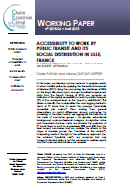
Energy efficiency in French homes: how much does it cost?
par Edouard Civel et Jérémy Elbèze
(disponible en anglais uniquement)
A strong cut in heat consumption can be realized by the thermal renovation of buildings: this article gives an assessment of energy savings achievable in the French residential stock and their associated investment costs. A bottom-up approach, using a dataset on material and labor costs for renovations and a thermal model (including a representation of the “rebound effect”) is applied to a description of existing dwellings in France. Renovation investment costs increase with the efficiency target of the housing stock: two inflection points are identified, for 40% and 60% reduction targets. If the first inflection is driven by a quantity effect, the second one is pushed by a price effect. Specificities of the thermal renovation market imply a lock-in risk: at the micro-scale, the discount rate could induce households to realize low ambition renovations, whereas at the macro-scale, having successive short-term objectives triggers important over-costs, above 15% of the optimized investment costs. We suggest that policy-makers take the risk of low ambition renovations into account, as it may nip the potential of energy savings in the bud. Relevant policies would set today the long-term efficiency target and earmark public incentives, like tax credits or interest-free loans, to ambitious renovations.
